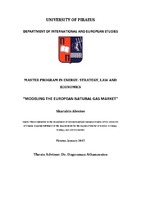Modeling the european natural gas market

Master Thesis
Συγγραφέας
Σκαράκης, Αλέξιος
Skarakis, Alexios
Ημερομηνία
2017-01Επιβλέπων
Δαγούμας, ΑθανάσιοςΠροβολή/
Λέξεις κλειδιά
Natural gas ; European Union ; Energy security ; Gas system ; Global markets ; Integration ; Oversupply ; Static equilibrium model ; Cost minimizationΠερίληψη
Even though E.U.’s natural gas markets are in a transitional stage towards liberalization, there are huge differences between North-Western and South-Eastern markets, which eventually prevent integration. Without complete integration, energy security considerations are not to be taken lightly. The dynamic character of natural gas trade allows policy-makers to implement energy policies on trade patterns, which could mitigate import dependency on a single supplier. While E.U. can never be completely independent from Russian natural gas imports, it is possible to differentiate its trading routes and sources. In the current thesis, I study in detail the E.U. natural gas market and system, and of lesser extent the markets of external suppliers, which affect the most E.U.’s gas market. I also deploy a static equilibrium model, based on the economic and trade theory, to quantify results of import dependency, in respect to production and transportation costs. The equilibrium that arises, focuses in maximizing consumers’ benefits, by minimizing the final cost of natural gas import. Through non-linear programming, the minimization problem produces interesting results and insights to “whether” and “how much” an E.U. Member-State is dependent on a single supplier. It is also a simple but useful tool for any policy-maker who wants to minimize the final import costs, while increasing energy security. Furthermore, the user is able to implement energy policy scenarios based on the initial structure of the model and calculate their additional opportunity costs or benefits. The model can improve the performance of natural gas trade by computing optimal and feasible solutions, and addressing market failures, such as excessive market power, externalities, and price discrimination. However, when such market failures arise, they must be addressed through corrective regulation, but without reducing critical benefits from the markets, such as consumers’ welfare.


